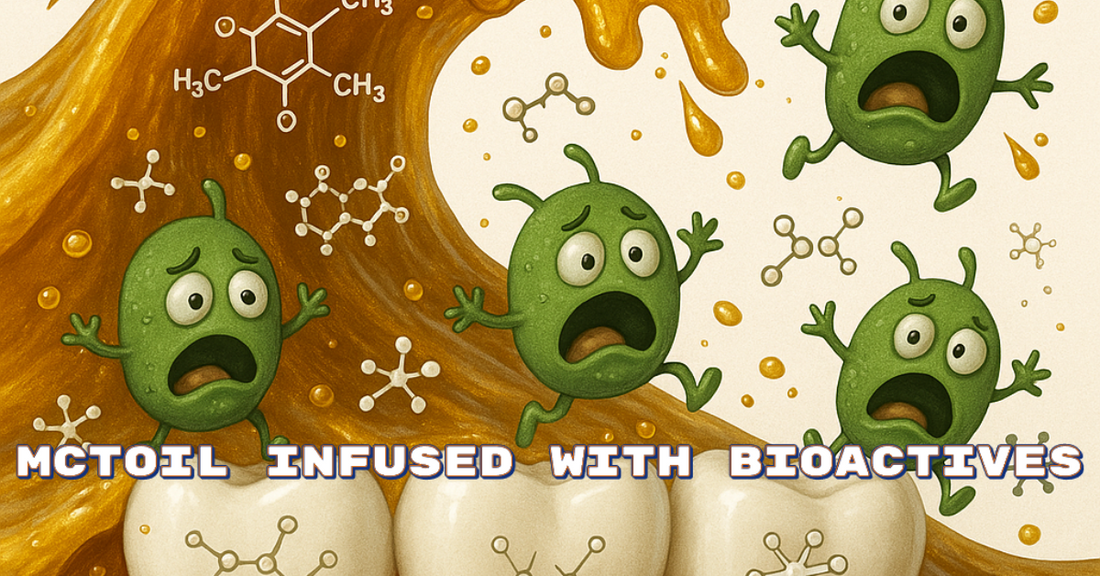
MCT Oil: From Ayurvedic Tradition to Precision “On The Go” Oral Care
Now, we understand so much more about how our mouths affect our overall health. And a big takeaway is that the kind of oil you use really matters.
At MoreGood Gum™, we picked MCT Oil not just because it feels smooth, but because it's a powerhouse ingredient. It helps carry other good stuff, cleans things out, and even tackles bad microbes. In a way, it's like oil pulling, but condensed and updated into a quick, effective system.
Old Wisdom, New Understanding
Ancient Ayurvedic traditions believed oil pulling would "draw out toxins." People usually used sesame or coconut oil, swishing it for 10 to 20 minutes every morning.
From a modern science viewpoint, they were onto something:
- It grabs onto bad stuff: Lots of bacteria and their toxins are fat-soluble, meaning oil can stick to them and carry them away.
- Breaks up plaque: The act of swishing physically helps break down plaque and those sticky bacterial films.
- Forms a protective layer: The oil creates a barrier over your mouth's surfaces, helping to shield tissues from irritation or getting re-colonized.
But traditional oils have their downsides. They're made of long-chain fats, which means they take longer to break down, don't get into places as easily, and can go bad quicker.
That's where MCT Oil comes in and it's a huge step forward.
What Makes MCT Oil Different
MCT stands for Medium-Chain Triglycerides, usually from coconut or palm kernel oil. These smaller fat molecules (typically C8–C10 chains) act very differently than the longer ones.
- Super fast absorption: MCTs don't need bile to be digested, so your body can absorb them quickly and get them where they need to go.
- Fights germs: Caprylic (C8) and capric (C10) acids naturally fight off fungi and bacteria, especially by breaking down their protective outer layers.
- Thin and spreadable: MCT oil coats your mouth quickly and evenly without feeling greasy or heavy.
Think of it as smart oil pulling, it can loosen up those sticky films, help you produce healthy saliva, and create a clean slate for other beneficial ingredients to work even better.
MCT Oil in MoreGood Gum™
In MoreGood Gum™, MCT oil is the first thing that goes to work when you bite into our LiquidCore™. It's not just a vehicle; it's an active player.
Here's what it does:
- Washes your mouth: It gets your saliva flowing and helps distribute the other ingredients.
- Cleans the surface: It helps emulsify debris and coats your mouth's surfaces, making it harder for bad germs to latch on.
- Feels amazing: It adds a smooth, soothing feel to the strong mint and burst of good stuff, leaving your mouth feeling both fresh and comforted.
We chose MCT oil because it perfectly matches our goal: to protect your oral health, help your body heal, and make the whole experience enjoyable.
The Entourage Effect: MCT's Key Role
MCT oil is useful on its own. But as part of the MoreGood Gum™ Entourage Effect, it plays a crucial role, helping everything work together even better.
- It helps Totarol™ coat and get into microbial films.
- It assists Zinc Citrate in reaching smelly sulfur compounds and binding to inflamed areas.
- It creates a smooth surface for spherical Hydroxyapatite to stick where enamel might be weak.
- And it keeps Xylitol moving, helping to starve out harmful biofilms without any stickiness or residue.
You could say MCT oil is the conductor of this orchestra of bioactives—not overpowering, but absolutely essential for a harmonious performance.
And unlike traditional oil pulling, you don't need to swish for 20 minutes. You just chew.
A Ritual, Reimagined
We didn't invent using oil for oral care—ancient wisdom got there first.
What we've done is perfect it. Condense it. Engineer it.
So the next time you chew MoreGood Gum™, you're not just freshening your breath. You're activating a little ritual of protection - rooted in the past, perfectly tuned for today.
References
-
Asokan, S., Emmadi, P., Chamundeswari, R. – Effect of oil pulling on plaque induced gingivitis: a randomized, controlled, triple-blind study. Indian Journal of Dental Research, 2009.
-
Ogbolu, D. O., Oni, A. A., Daini, O. A., Oloko, A. P. – In vitro antimicrobial properties of coconut oil on Candida species in Ibadan, Nigeria. Journal of Medicinal Food, 2007.
-
Kabara, J. J., Swieczkowski, D. M., Conley, A. J., Truant, J. P. – Fatty acids and derivatives as antimicrobial agents. Antimicrobial Agents and Chemotherapy, 1972.

 https://moregoodgum.com
https://moregoodgum.com
